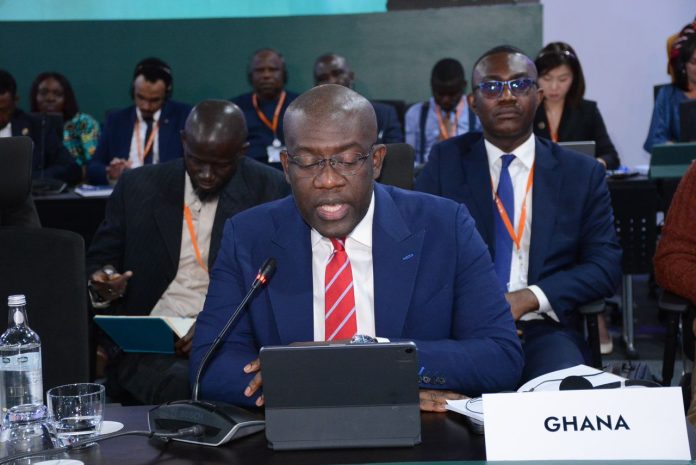The Minister for Works and Housing, Mr Kojo Oppong Nkrumah has called for an urgent focus on sustainable financing mechanisms to fund affordable housing projects across the country.
He made the appeal during a strategic meeting with the Deputy Executive Director of the United Nations Human Settlements Programme (UN-Habitat), Michal Mlynár, on the sidelines of the World Urban Forum held in Cairo last week.
Minister Oppong Nkrumah, who led a high-level Ghanaian delegation, comprising officials from his Ministry and the Ministry of Local Government and Rural Development, highlighted Ghana’s pressing need for innovative and robust financing solutions that would accelerate housing delivery and ensure long-term urban sustainability.
“Our commitment is to make affordable housing accessible to Ghanaians in both urban and rural areas. However, to succeed, we need to embrace new, sustainable financing models that leverage both private and public sector partnerships,” he stated.
In his discussions with Mr. Mlynár, the Minister emphasised that while Ghana has made strides in infrastructure and economic growth, the housing sector remains underserved, with a persistent housing shortfall affecting millions.
He stressed that sustainable financing would not only address this deficit but would also align with global sustainable development goals (SDGs) by promoting resilient, inclusive and eco-friendly urban communities.
Minister Oppong Nkrumah used the platform to call upon international organisations, development banks and private investors to consider Ghana’s housing sector as a viable, impactful investment opportunity.
“We are actively seeking partnerships that can bring in both technical expertise and financing structures to support our housing agenda. This is not only about providing homes but also about enhancing our communities and ensuring that urban growth is balanced with environmental preservation,” he noted.
The Minister pointed to ongoing initiatives in Ghana aimed at bolstering the housing sector, such as the government’s recent affordable housing projects and district-level housing programmes. He acknowledged the challenges the country faces, including limited access to affordable credit for developers and homebuyers, as well as the high cost of construction materials.
“Addressing these issues requires more than just government intervention; it requires a holistic approach where stakeholders at all levels are committed to a shared vision,” he remarked.
Mr. Mlynár expressed his support for Ghana’s efforts and commended the government’s proactive steps in addressing urban development challenges.
He noted that UN-Habitat stands ready to support countries like Ghana by providing guidance on best practices, technical assistance, and platforms for dialogue with potential funding sources. “The World Urban Forum serves as a hub for knowledge-sharing and partnerships, and we are encouraged by Ghana’s dedication to sustainable urban development,” Mr. Mlynár said.
Meanwhile, Ghana has to accelerate efforts toward the New Urban Agenda through strategic partnerships and local innovation.
Speaking at the twelfth Session of the World Urban Forum, Minister Oppong Nkrumah reaffirmed Ghana’s commitment to implementing policies that foster social inclusion and resilience in housing, with a particular focus on low-income groups and the informal sector.
“Housing is a basic human right and our role as leaders is to ensure that every Ghanaian has access to safe, affordable housing. This is integral to our national development goals,” he said.
The World Urban Forum offered Ghana a unique opportunity to connect with global thought leaders and potential investors.
As discussions unfolded in Cairo, the Ghanaian delegation stressed the importance of proactive, sustainable solutions that would not only alleviate the housing shortage but also promote job creation and economic growth.
This, Minister Oppong Nkrumah concluded, by reiterating the government’s resolve to “redefine the future of housing in Ghana, transforming it into a model for sustainable urban development in Africa.”








